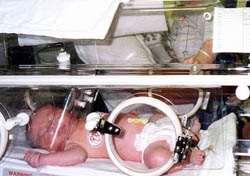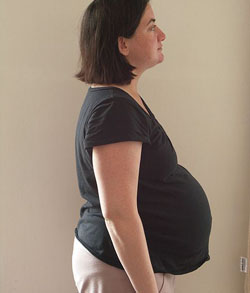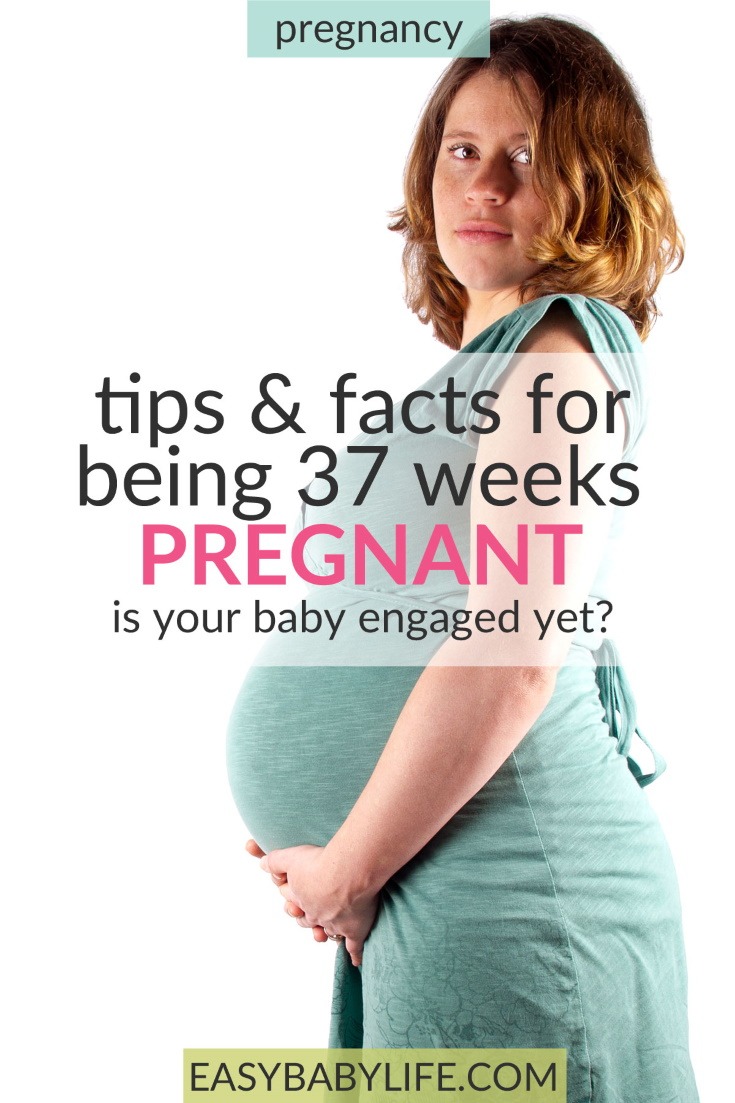37 weeks pregnant… This week an important milestone will be reached – by the end of week 37, you no longer have a preemie in your womb. However, he or she is actually NOT considered full-term either…
Let’s take a deep look at baby development, pregnancy symptoms, and prepping for childbirth!
Week 36 | Week 38
What to Expect When 37 Weeks Pregnant
In this article:
Is My Baby Full-term at 37 Weeks?
This week an important milestone will be reached – by the end of week 37, you no longer have a preemie in your womb.
Not so long ago, a baby was considered full-term if born after full 37 weeks of pregnancy. You might even hear it or read it somewhere still. However, that has changed in the meantime, and babies are no longer considered full-term until the full 39 weeks of pregnancy have passed.
Babies born at 37 weeks might seem big and healthy and look like they are full-term. However, a study published in 2013 that covered nearly 30,000 live births in Erie County, from Jan. 1, 2006, through Dec. 31, 2008, showed that at 37 weeks, babies are still physiologically immature and have a higher risk of suffering from health complications than full-term babies. (You’ll find a link to the study among the references below.)
After realizing that babies born at 37 or 38 weeks were at significantly higher risk for adverse outcomes, the official guidelines changed.
The American College of Obstetricians and Gynecologists (ACOG) put out an official statement in 2013. Babies born in a period between full 37 weeks to 38 weeks 6 days are now considered early-term.
So, if your baby is born by the end of this week, it would still be considered early-term.
We know that most of the time, women can’t control when they give birth. Most babies are born late preterm or early-term because of premature labor.
However, in case you were considering voluntary early induction, it is good to be informed that there is a significantly higher risk for health complications if the baby is born before the full 39 weeks of pregnancy.
While most women will not give birth until a couple more weeks have passed, it is certainly time to start preparing. Reading our tips and advice on giving birth is a good start!
How Many Months is 37 Weeks Pregnant?
When pregnant for the full 36 weeks, you enter the last month of pregnancy. So, at this point, you are in month 9 of pregnancy. You only have a few more weeks to go.
You can read about how the pregnancy weeks and months are counted in the article we wrote to explain the logic behind it and make it easier to understand.
Your Baby at 37 Weeks
How Big is my Baby at 37 Weeks?
 PinThe fetal age of your baby is now 35 weeks.
PinThe fetal age of your baby is now 35 weeks.
The baby in the picture was born at the end of pregnancy week 37. Not all babies need the incubator at this age, but some may, due to, for example, a very quick or tiresome birth process.
This particular baby was not small, weighing 7.9 pounds (3.6 kg), despite being born three weeks early.
The average weight for a baby by the end of this week is approximately 6.3 pounds (2.8 kg), and the length is around 19 inches (48 cm) from crown to feet. Your baby is now the size of a small pumpkin.
What Does My Baby Look Like at 37 Weeks Pregnant?
Each day your baby is gaining fat stores that can measure at almost half an ounce a day, which gives them a plumper appearance at birth instead of the pink, wrinkly skin they had before.
Fetal development
Although the baby doesn’t have enough room to kick hard, it is still important to regularly feel your baby’s movements. At this point, these will probably be felt as squirming.
If you think your baby is not moving enough or has stopped moving, contact your doctor immediately. It is always best to check and be sure that everything is okay.
For a few weeks now, your baby has been practicing sucking and swallowing to get ready for feedings once they are born.
Your baby also continues to practice breathing by inhaling amniotic fluid. They make grasping motions with their fingers.
Mom’s Body When 37 Weeks Pregnant
The Belly
 PinAt 37 weeks pregnant, your belly is pretty big probably, and there may be times when you are thinking about how you can’t sleep comfortably, aren’t able to bend over to tie your shoes (or even see your shoes, for that matter!), and walk for long distances.
PinAt 37 weeks pregnant, your belly is pretty big probably, and there may be times when you are thinking about how you can’t sleep comfortably, aren’t able to bend over to tie your shoes (or even see your shoes, for that matter!), and walk for long distances.
Not to mention trimming that bikini line… ;-D
But soon, your pregnancy will be over, and all of the discomforts of the last few weeks will be a distant memory. Try to focus on the positive aspects of the last few weeks of your pregnancy and how you will have a new baby in just a few short weeks.
If you use your time at home while waiting for your baby to prepare you and your home for their arrival, you may find the time going by faster than when you wait in anticipation.
Pregnancy Symptoms
With only approximately 3-4 more weeks to go, your baby is also getting ready for their big entrance into the world!
Some babies will engage during this time, placing their head further down into your pelvis to prepare them for the birth and position them into the birth canal.
For some women, this can ease the discomfort of having heartburn or experiencing shortness of breath. On the other hand, it can also create extreme pressure in the pelvic region, causing discomfort for the next few weeks.
Most of the symptoms you are experiencing this week are not that different from those you’ve experienced for the last few weeks or even longer.
Because your baby is pressing on your bladder, you are probably experiencing the need for frequent urination. It is annoying to have to get up constantly to go to the bathroom, especially when you want to sleep. However, as we always point out, hydration is essential throughout pregnancy. So, don’t skip on drinking plenty of water in hopes you will need to go to the bathroom less often.
Sometimes, you might be unsure whether you are experiencing urine leaking, vaginal discharge, or amniotic fluid leaking. Although vaginal discharge increases as the pregnancy advances, if you feel a steady trickle or a gush of fluid, that might be the amniotic fluid leaking, in which case you should contact your doctor.
Because of the constant need to pee, the size of your belly, different aches and pains, and maybe also because of a bit of anxiety that you feel, you probably have trouble sleeping. A pregnancy pillow or even normal pillows between your legs and behind your back as support might help you find a more comfortable position to sleep in.
However, keep in mind that, especially in the third trimester, it is recommended to sleep on your side, particularly your left side, as it allows for more nutrients and blood to reach the placenta and the baby.
Being 37 weeks pregnant, some women will find their breasts begin to increase in size as their body prepares for feeding the baby once they are born. You may even notice a small amount of colostrum leaking as well. This is perfectly normal, and many women find it exciting to know that their body is also preparing for the baby’s arrival.
If you didn’t get stretch marks until now, don’t be surprised if they appear. Stretch marks can appear at any time during pregnancy. And with your belly and your breasts being bigger than ever before and still slowly expanding, it is not unusual for the skin to become stretched and broken in places.
There might be some swelling in your legs and feet because your body retains more fluid. It would be best for you to spend less time on your feet and rest with your feet elevated.
Keep an eye on severe and sudden swelling because it might point to preeclampsia.
With your cervix being sensitive, a small amount of spotting and light bleeding is normal. However, if you notice more than a little spotting, call your doctor, as it might point to placenta problems. Either way, always call your doctor when you aren’t sure if something is common and considered normal or not. It is always better to be safe, and it will also help to ease your worries.
Some women will find that they lose their mucus plug in the last month of pregnancy as their body gets ready for birth, while others may not lose their mucus plug until shortly before they begin the labor process. Each woman’s body is different, so you may find that your mucus plug is expelled early, or you may not notice it at all.
If you haven’t already, you might start to experience Braxton Hicks contractions. These are false, “practice” contractions that remain irregular and usually disappear with rest and sleep or when you change position. They also don’t increase in frequency, duration, or interval.
On the other hand, true contractions begin as irregular contractions and become regular with time. They increase in frequency, duration, and interval and don’t stop even when you rest and sleep. If you think you are experiencing true contractions, contact your doctor.
Things to do and buy this week
Try not to compare you and your baby to other women and their babies since each birth is unique. However, it might be helpful to familiarize yourself with many different scenarios and signs of labor in order to prepare for the big day. By knowing what to look for and the many signals your body gives off before labor, you will be able to prepare yourself and your partner for the whole birth process.
I bet you have already started to prepare for D-day. If not, don’t wait. Knowing about the process and what to expect really helps, trust me… ;-) Visit our section about giving birth here.
During your check-ups, among other things, your doctor will check whether your cervix has begun to dilate. In other words, they will check if your cervix has opened or how far it has opened. For the baby to pass through the birth canal, the cervix needs to open to 10 centimeters.
Get immediate expert help with your pregnancy questions through JustAnswer Pregnancy:Week 37 Pregnancy Video
Diary of a Daughter
What’s it really like being 37 weeks pregnant…? Here’s a true diary from a mom who should have been 37 weeks pregnant. (Me..!)
Diary Of A Daughter
I can feel that it is getting closer… I’ve started to have more contractions again, some even a bit painful.
I am practicing a lot of breathing, and since I am now “allowed” to give birth, I have started to take walks. I’m in such poor condition! But the strength is coming back now when I can finally go out. I can really feel it! :-D
Are you also 37 weeks pregnant? Please share your experiences and thoughts by leaving a comment below!
Read Next
- How to induce labor naturally
- Why does labor have to hurt
- The exciting signs of labor. Is it time..?
- Childbirth videos that are helpful (even when you’re pregnant)
Week 36 | Week 38
References
- Preeclampsia symptoms and causes
- Mayo Clinic, Mayo Clinic Guide to a Healthy Pregnancy
- Joanne Stone MD and Keith Eddleman MD, The Pregnancy Bible: Your Complete Guide to Pregnancy and Early Parenthood
- Nilsson, L; Hamberger, L. A Child Is Born
- Mittendorf et al (1990), The Length of Uncomplicated Human Gestation, Obstetrics & Gynecology, V.75, N.6, June 1990
- Leaking Amniotic Fluid During Pregnancy: What Does It Feel Like?
- Boyle E M, Poulsen G, Field D J, Kurinczuk J J, Wolke D, Alfirevic Z et al. Effects of gestational age at birth on health outcomes at 3 and 5 years of age: population based cohort study BMJ 2012; 344 :e896 doi:10.1136/bmj.e896
Images: Preterm baby image by Cletch

Paula Dennholt founded Easy Baby Life in 2006 and has been a passionate parenting and pregnancy writer since then. Her parenting approach and writing are based on studies in cognitive-behavioral models and therapy for children and her experience as a mother and stepmother. Life as a parent has convinced her of how crucial it is to put relationships before rules. She strongly believes in positive parenting and a science-based approach.
Paula cooperates with a team of pediatricians who assist in reviewing and writing articles.







